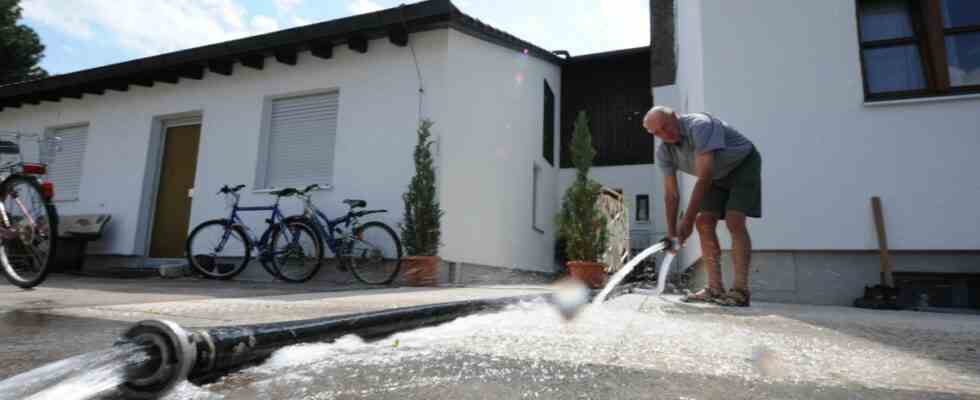For ten years Feldmochingen homeowners have been arguing with the city about whether mistakes in the construction of a street sewage canal are responsible for the fact that heavy rain in the summer of 2010 – and since then repeatedly – flooded numerous basements on the northern edge of the city, along the A 99. After a hearing before the Higher Regional Court (OLG), the process could now end in a settlement that is not very lucrative for the residents, or it could drag on for years.
The key question: Was the construction of the north-west collector sewer bungled in the 1990s, for example by leaving material behind in the surrounding soil and encasing the meter-thick pipe in impermeable concrete instead of gravel that could flow through? What sounds like good insulation is likely to have caused the problem in the first place, as experts had stated years ago: The water that penetrated into the cellar does not come from the sewer itself, rather it lies partly at right angles to the groundwater flow and dams it up like a dam, which can be demonstrated by means of different water levels.
The fact that the flooding is actually due to this remained controversial for a long time, since the groundwater level there is much higher than in the south of Munich, for example. Since the mid-2010s, the city has been trying to drain the groundwater via culverts, i.e. crossings under the canals, with moderate success and undesirable side effects, such as a crater that opened in 2015, because of the rubble-filled subsoil. Allianz acts in the background of the process, refusing to pay for damages as the municipal liability insurer. So far, the city and the Munich municipal drainage have not wanted to step in on their own funds, almost as a gesture of goodwill, because according to their own legal opinion they would embezzle budget funds and fee money. Parallel to the civil matter in the second instance at the Higher Regional Court, proceedings are now underway at the administrative court.
An unsealed basement sometimes fills up naturally
Lawyer Georg Krafft, who represents the city, initially addressed the problem of high groundwater as to whether the plaintiffs would have wanted dry basements at all during construction. After all, according to Krafft, without a water-impermeable shell (“white tub”), the best that can be done in the affected area is an old-style “potato cellar”, which then naturally fills up regularly or at least gets wet.
Higher Regional Court judge Thomas Steiner, on the other hand, made it clear that this site-specific “building ground risk” fades into the background as soon as one can assume that the city is at fault. For this, however, geological and other structural engineering reports are needed, and witnesses must be heard. At least the current “mercantile reduction in value” of the property caused by the risk of flooding has long since been compensated for by the market by the time the proceedings are expected to be completed in the 2030s or 2040s, is Steiner’s deliberately exaggerated consolation for the plaintiffs – or for their heirs.
Alternatively, the judge proposed a comparison – aware that this would have to appear “shabby and unattractive” to the plaintiffs: the city would therefore pay 150 euros per square meter of damaged basement area, i.e. 15 percent of the 1000 euros demanded with a view to thorough mold removal Steiner considered excessive. The depreciation would remain uncompensated. For the plaintiff’s attorney, Benno Ziegler, this is an unsatisfactory but not entirely disappointing interim result: the time factor is likely to play a key role, after all, two plaintiffs have already died in the course of the proceedings.
However, Ziegler considers it more important that the Higher Regional Court for the first time also granted homeowners the possibility of claims for damages if they did not seal their basements in moist soil zones according to the highest standard. The lawyer expects a precedent effect city-wide, especially for the residents of Genter Straße near the north cemetery, who have sued the city in a similar case. The plaintiffs must now decide whether they agree to the settlement proposal.

